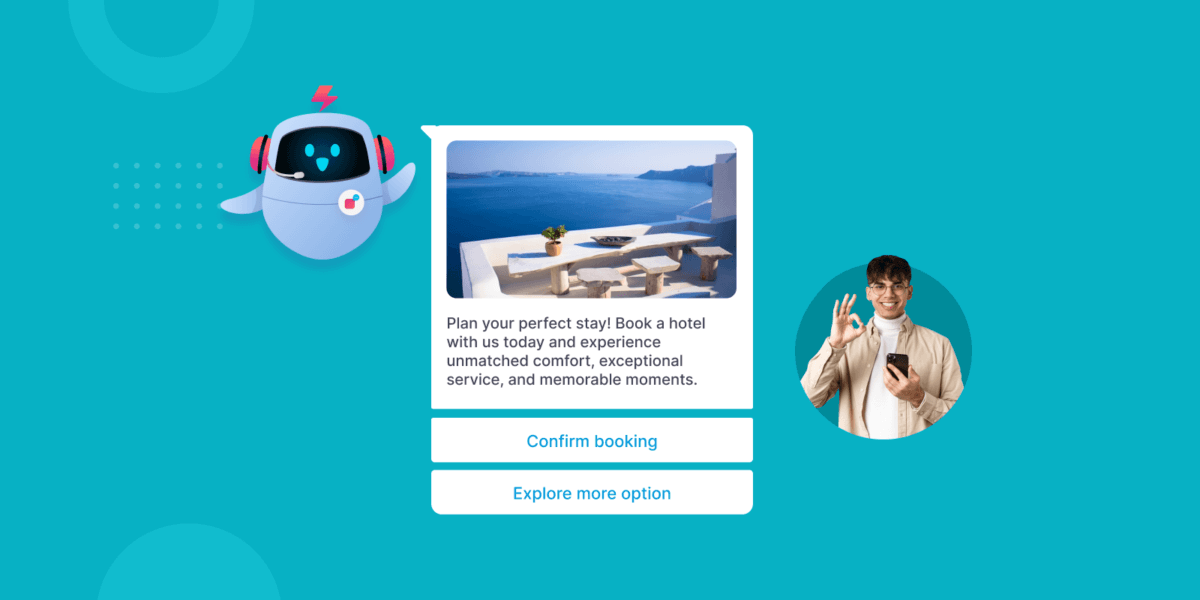From Chats to Stays: Exploring Conversational AI in Hospitality

From Chats to Stays: Exploring Conversational AI in Hospitality
In the not-too-distant past, customer service in the hospitality industry relied heavily on face-to-face meetings, phone calls, and emails. While these traditional methods had their merits, they often fell short, leading to time-consuming processes, frustrations for guests and staff, and long wait times during peak periods.
However, the modern hospitality industry is undergoing a rapid transformation. Thanks to Conversational AI-driven tools like hospitality chatbots, businesses now have the means to revolutionise customer experiences, streamline operations, and boost efficiency.
By integrating hospitality chatbots into hotel and travel websites and other messaging platforms, businesses can meet the evolving needs and high expectations of today’s customers.
Join us on our blog as we explore the world of hospitality chatbots. Discover their numerous benefits, explore real-world use cases, and delve into the critical components of conversational AI technology that powers them.
Table of Contents
- Conversational AI-Driven Hospitality Tool
- Benefits of Using Conversational AI Solutions in the Hospitality Industry
- Use Cases of Conversational AI in Hospitality
- Critical Components of Conversational AI Technology
- Gain A Competitive Edge with Conversational AI
Conversational AI-Driven Hospitality Tool
Conversational AI-driven tools like hospitality chatbots are solutions designed to assist guests via helpful information and support during their hotel or travel stay. These tools use NLP and ML, which enable them to interact with users in natural language.
The primary aim of designing the hospitality chatbot is to enhance customer service by providing on-site personalised support.
With AI-driven chatbots, guests can quickly check in to the hotel from their mobile device without waiting at the front desk, booking reservations, ordering room service, etc., just at the tip of their fingers.
Suggest Reading: Impact of Voice ai in Tourism and Hospitality Industry
Benefits of Using Conversational AI Solutions in the Hospitality Industry
1. Improved Guest Experience
Guest satisfaction is a comprehensive assessment of how happy and fulfilled guests were with your service from start to finish at all touchpoints—from visiting the website to the stay experience to post-stay and customer support.
A conversational AI-driven chatbot helps you offer the best customer experience. It assists customers in direct booking and communicating with guests in multiple languages. Solve their queries in real time. And In case the questions demand special attention, the chatbot escalates the concern to the staff to resolve it.
Additionally, the chatbot suggests additional services or amenities that guests may be interested in, like spa treatment, room upgrades, etc., enhancing the guest experience.
2. Increased Efficiency and Cost-Saving
Hotels and travel businesses use a chatbot to automate routine tasks such as answering FAQs, taking reservations, providing recommendations, etc. Automating these repetitive tasks alleviates the work pressure on staff and frees them to focus on other crucial tasks.
At the same time, the chatbot offers 24/7 customer service, which reduces the need for hotels to have staff working odd hours. This also reduces the need for extra staff during peak periods and saves on labour costs.
3. Increased Revenue
Chatbots typically recommend customised services and benefits when talking with customers based on their previous conversations and desires. During this process, the chatbot will upsell and cross-sell the services that customers may be interested in, which increases business revenue.
The chatbot brings immediate help and deals with problems in real time, raising customer satisfaction and causing them to return and leave good reviews, which means more business.
Use Cases of Conversational AI in Hospitality
1. Room Booking
Hotels and the travel industry use conversational AI to assist guests with room booking. Guests can easily converse with chatbots, declare their likes and dislikes and receive assistance in selecting the best room, checking availability and booking a room. Guests don’t need to wander through a website, search for info and make the reservation independently.
Not only that, but conversational AI also studies the past booking history of the guest, their online behaviour, and social media activities, and based on that, provides personalised recommendations for rooms and amenities. And once the guest is happy, the chatbot instantly confirms the reservation.
2. Customer Service
Many hotels, travel agencies, and tour operators use conversational AI to give customers 24/7 customer service. This AI can quickly respond to customer queries, enhancing the customer experience and reducing wait times. They principally answer frequently asked questions and provide information on amenities, services, facilities, etc. Other than that, the chatbot can also be used to request room service, housekeeping, etc.
3. Personalised Recommendation
Conversational AI, like a chatbot, can collect customer data and keep track of their activities. The information can be further utilised to offer various personalised recommendations for fun activities, restaurants, hotels, etc. For instance, travel and tourism can analyse customers’ previous activities and suggest personalised recommendations for exotic places and adventures.
Likewise, AI can be used to predict customers’ future actions based on their past behaviours. For instance, if the customer has travelled to different places during the summer holidays, the AI can predict that the customer is likely to cross again during the same month and offer recommendations for trending places to visit.
4. Online Brand Management
Customers mostly rely on online reviews as trusted sources while booking trips or hotel reservations. So it becomes critical to watch what customers say about the brand. That’s because any negative review can cost you your brand reputation.
Conversational AI-driven tools can be used to keep track of customer reviews and comments on social media. The AI can quickly analyse and respond to negative feedback, which helps improve guest satisfaction and loyalty.
Likewise, hospitality chatbots help hotels identify improvement areas and quickly address negative feedback. Hotels and travel companies can engage with customers in different channels, build strong connections, and create more engaging experiments.
5. Price Optimisation
It’s common for airlines and hotels to raise prices on repeat flights or hotel searches. Conversational AI uses predictive analytics always to show the most reasonable prices. The system understands the pricing strategies and delivers the most suitable offers at the optimal price based on the customer’s preferred time. This lets customers track deals and get competitive pricing data to understand the best time to book a holiday.
Critical Components of Conversational AI Technology
1. NLP
Natural language processing is part of an AI that enables machines to understand human language. It takes in the language in spoken or written form. Then it interprets the language in a way a computer can understand. That is in the form of code.
For instance, if you talk about virtual assistants like Siri, Alexa, or Cortana, there is NLP behind them. The NLP helps them understand the user’s command and respond in natural language. These programs also use NLP when you see automatic suggestions while typing emails or web searches. It reads, analyses and answers your message.
2. Machine Learning
Machine learning is an AI technique that allows machines to learn from experience. The more it performs, the more it knows without being explicitly programmed. Machine learning algorithms perform tasks when you feed them examples of labelled data. That helps the AI make calculations, process data, and identify patterns automatically.
For example, when you teach machines to label things like chairs and tables by showing them examples of furniture, eventually, they will start marking chairs and tables without any help, as they learned from relevant and accurate training examples.
Machine learning can handle massive amounts of data and can perform much more accurately than humans. They can solve customer pain points, support ticket automation and data mining from various sources.
3. Sentiment Analysis
Sentiment analysis is an NLP technique that determines the emotions behind the text. Whether the reader is positive, negative, or neutral, it is mainly used to evaluate customer feedback, survey responses, and product reviews.
The analysis helps you discover why customers are happy or unhappy at each customer journey stage. And in case you detect disgruntled customers, you can immediately respond as soon as possible. Also, you can tailor your products and services to meet the customer’s needs.
Meanwhile, you can’t imagine manually sorting through an uncountable number of tweets, customer-supporting conversations, or surveys. Right? It becomes next to impossible to sort to process those data manually. That’s when sentiment analysis helps your business process large amounts of unstructured data efficiently and cost-effectively.
Suggested Case Study – AbhiBus Achieved 33% Increase In Agent Productivity After Moving To Live Chat Service
Gain A Competitive Edge with Conversational AI
In the dynamic landscape of the hospitality industry, enhancing guest experience is paramount. Enter conversational AI, a game-changer that offers faster, personalised service, enabling staff to focus on vital responsibilities.
If you’re seeking a competitive edge through a robust conversational AI-driven hospitality solution, Verloop.io is here to assist. Our platform empowers your hospitality business to provide round-the-clock, multilingual support to website visitors via a conversational AI-driven chatbot. Experience complete automation of guest engagement, lead qualification, and even leverage drip marketing on WhatsApp and beyond.
Embrace the power of conversational AI and revolutionise your guest experience today with Verloop.io.






